Fred Korematsu, an American civil rights pioneer, resisted the internment of Japanese Americans during WWII.
Born in 1919 to Japanese immigrants in Oakland, he was renamed Fred by a teacher for simplicity. In 1941, after the Pearl Harbor attack, the U.S. heightened suspicions towards Japanese Americans.
Despite no evidence of Japanese American disloyalty, President Roosevelt signed Executive Order 9066 in 1942, leading to their forceful relocation.
Korematsu, considering himself an American, defied the order and even altered his identification.
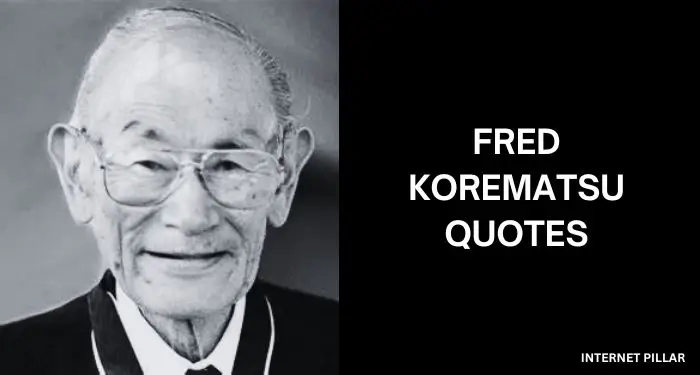
Arrested and imprisoned, he met ACLU attorney Ernest Besig, who took his case to the Supreme Court. However, the Court upheld Korematsu’s conviction in 1944.
In 1981, Peter Irons discovered the government had provided falsified information in Korematsu’s original case.
Korematsu’s conviction was vacated in 1983 after a retrial. Although the original Supreme Court decision remains, Korematsu worked tirelessly for Japanese American rights.
He played a pivotal role in the Civil Liberties Act of 1988 and was awarded the Presidential Medal of Freedom in 1998.
Fred Korematsu Day is celebrated annually on January 30th in California.
Let’s dive into some of the most popular quotes by Fred Korematsu.
Top 5 Fred Korematsu Quotes
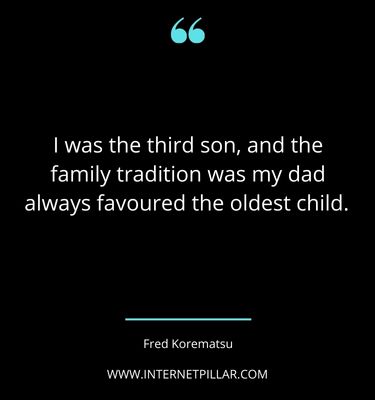
I was the third son, and the family tradition was my dad always favoured the oldest child. ~ Fred Korematsu.
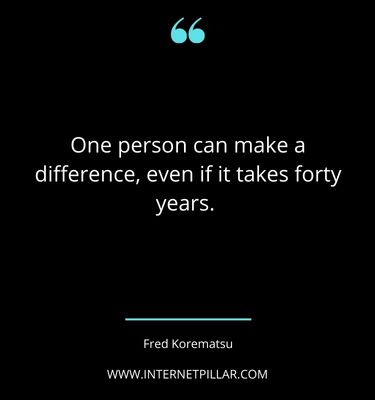
One person can make a difference, even if it takes forty years. ~ Fred Korematsu.

It may take time to prove you’re right, but you have to stick to it. ~ Fred Korematsu.
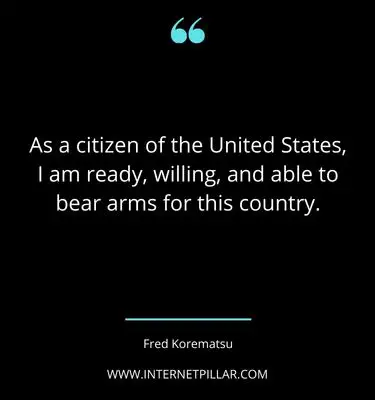
As a citizen of the United States, I am ready, willing, and able to bear arms for this country. ~ Fred Korematsu.
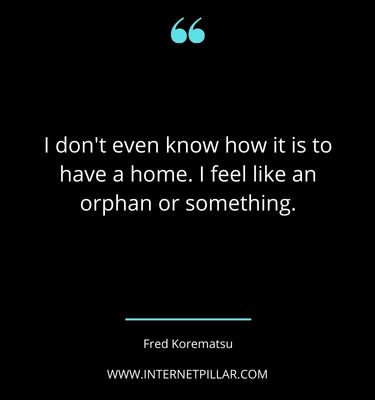
I don’t even know how it is to have a home. I feel like an orphan or something. ~ Fred Korematsu.
Powerful Fred Korematsu Quotes
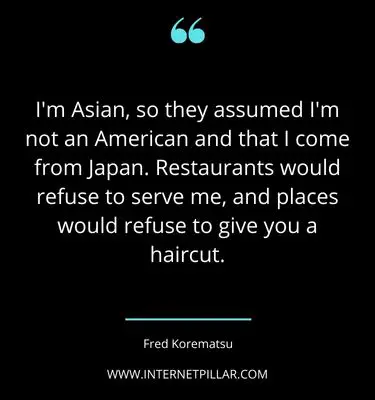
I’m Asian, so they assumed I’m not an American and that I come from Japan. Restaurants would refuse to serve me, and places would refuse to give you a haircut. ~ Fred Korematsu.
I was very upset because I did not have a fair trial to prove my loyalty to this country. ~ Fred Korematsu.
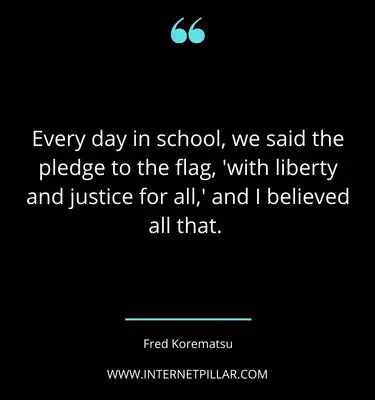
Every day in school, we said the pledge to the flag, ‘with liberty and justice for all,’ and I believed all that. ~ Fred Korematsu.
No one should ever be locked away simply because they share the same race, ethnicity, or religion as a spy or terrorist. If that principle was not learned from the internment of Japanese Americans, then these are very dangerous times for our democracy. ~ Fred Korematsu.
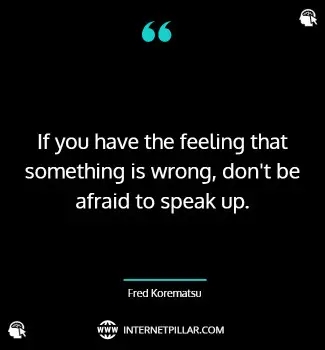
If you have the feeling that something is wrong, don’t be afraid to speak up. ~ Fred Korematsu.
I was just living my life, and that’s what I wanted to do. ~ Fred Korematsu.
Famous Fred Korematsu Quotes
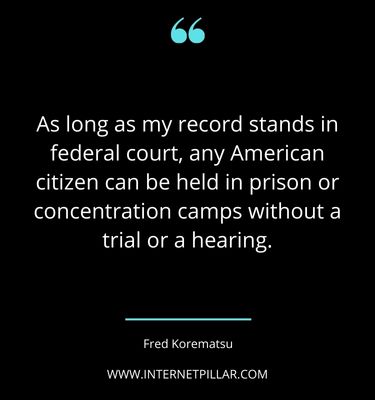
Before the war, my parents were very proud people. They’d always talk about Japan and also about the samurai and things like that. Right after Pearl Harbor, they were just real quiet. They kept to themselves; they were afraid to talk about what could happen. I assume they knew that nothing good would come out of it. ~ Fred Korematsu.
My folks were so worried about what they were going to do. All they can take was what they could carry with their hands. What they had for twenty-five years of building their business was going to go out the door, or they’re going to lose it. ~ Fred Korematsu.
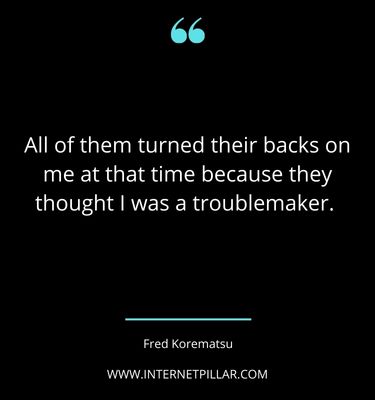
All of them turned their backs on me at that time because they thought I was a troublemaker. ~ Fred Korematsu.
I was an American citizen, and I had as many rights as anyone else. ~ Fred Korematsu.
That was it – I lost my job… I was very discouraged. I wanted to be in defense work… I’m an American, and I have nothin’ to do with Japan, and so it’s sort of an insult to me. ~ Fred Korematsu.
I still remember, 40 years ago, when I was shackled and put in prison… Being an American citizen didn’t mean a thing. ~ Fred Korematsu.
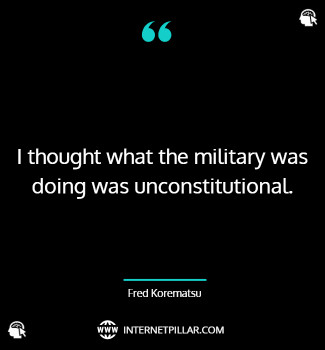
I thought what the military was doing was unconstitutional. ~ Fred Korematsu.
I didn’t think that the government would go as far as to include American citizens to be interned without a hearing. ~ Fred Korematsu.
Best Fred Korematsu Quotes
I’ll never forget my government treating me like this. And I really hope that this will never happen to anybody else because of the way they look, if they look like the enemy of our country. ~ Fred Korematsu.
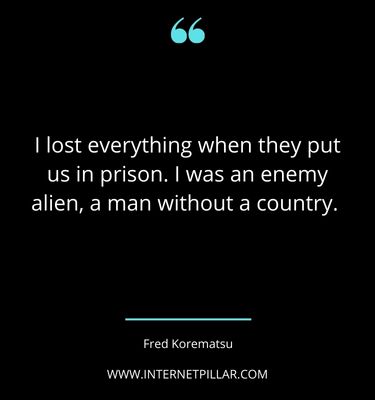
I lost everything when they put us in prison. I was an enemy alien, a man without a country. ~ Fred Korematsu.
If anyone should do any pardoning. I should be the one pardoning the government for what they did to the Japanese-American people. ~ Fred Korematsu.
I was born in the U.S. This is my country. ~ Fred Korematsu.
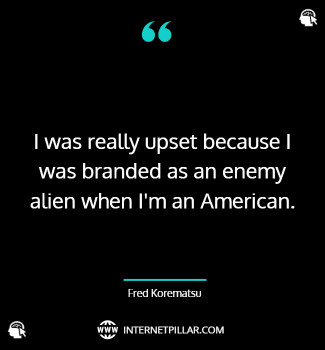
I was really upset because I was branded as an enemy alien when I’m an American. ~ Fred Korematsu.
It takes a lot of money to hire an attorney. ~ Fred Korematsu.
During the curfew, whoever went out, the people were watching you. Any Japanese home, there was some person figuring he’s a good American citizen by doing his duty, and they were watching every move each family were doin’. Or if they went out, they followed them to see where they were goin’. ~ Fred Korematsu.
So these were the 27 famous quotes about Fred Korematsu.
If you like these quotes and sayings, then you can also read my other posts on James Connolly quotes and Rocky Marciano quotes.
Short Biography of Fred Korematsu
Fred T. Korematsu a civil rights icon resisted the WWII-era internment of Japanese Americans and took his fight to the Supreme Court which unfortunately ruled against him in 1944.
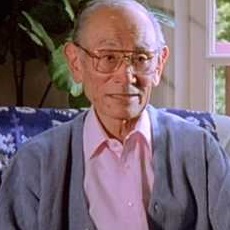
Decades later in 1983 hidden evidence proving the injustice of the internment came to light leading to the overturning of his conviction.
| Full Name | Fred Toyosaburo Korematsu |
| Known for | Korematsu v. United States |
| Born | January 30, 1919, Oakland, California, United States |
| Died | March 30, 2005, Larkspur, California, United States |
| Education | Castlemont High School |
| Spouse | Kathryn Pearson (m. 1946–2005) |
| Children | Karen Korematsu, Ken Korematsu |
| Parents | Kotsui Aoki, Kakusaburo Korematsu |
| Awards | Presidential Medal of Freedom |
| Resting Place | Mountain View Cemetery |
Korematsu’s dedication to justice earned him the Presidential Medal of Freedom and the establishment of Fred Korematsu Day in California marking him as a lasting symbol of resistance against injustice.
Quick Facts about Fred Korematsu
- Korematsu opposed the internment of Japanese Americans during World War II.
- Streets and schools across the US, like the Fred T. Korematsu Elementary School in California, are named after him.
- He faced lifelong discrimination due to his Japanese heritage, losing jobs and being denied military entry.
- Korematsu was arrested for evading internment orders in 1942.
- Post-9/11, he cautioned the US against repeating past discrimination mistakes.
- President Clinton awarded him the Presidential Medal of Freedom in 1998.
- Korematsu fought against unequal wages, experiencing pay discrimination after WWII.
- Born in Oakland, California, in 1919, he was the son of Japanese immigrants and faced racial discrimination from a young age.
- California established “Fred Korematsu Day of Civil Liberties and the Constitution,” making him the first Asian American honored this way.
- In 2011, California recognized January 30 as Fred Korematsu Day, followed by several other states.
Top Questions about Fred Korematsu
A: Fred Korematsu was known for resisting the internment of Japanese Americans and challenging Executive Order 9066, which led to their forced relocation and incarceration.
A: He was born in Oakland, California, on January 30, 1919.
A: The significant legal battle associated with him is Korematsu v. United States, where the Supreme Court upheld the internment orders but his conviction was later overturned.
A: He became a fugitive, refused to comply with internment orders, and took his case to the Supreme Court.
A: Despite the defeat, his conviction was overturned four decades later, and he continued to advocate for civil rights and justice.
A: Fred Korematsu Day is a day commemorating his civil rights activism, first celebrated on January 30, 2011, in California.
A: Before the war, he worked in his family’s flower nursery and faced racism, including being rejected by the U.S. Army and losing jobs due to his Japanese descent.
A: He refused to report to the assembly center, attempted to disguise his appearance, and went into hiding.
A: He was a welder, but lost employment opportunities due to his Japanese heritage following the attack on Pearl Harbor.
A: His case reached the Supreme Court through appeals, resulting in a 6–3 decision that upheld the internment orders as a wartime necessity.
A: He moved to Salt Lake City to avoid returning to the West Coast, faced continued discrimination, and remained quiet about his experiences for over thirty years.
A: He was awarded the Presidential Medal of Freedom by President Bill Clinton in 1998.
A: He spoke out against racial profiling and filed amicus curiae briefs with the Supreme Court to prevent the repetition of past mistakes.
A: The institute focuses on educating and advocating for civil liberties for all communities, continuing Korematsu’s legacy.
A: His experiences of internment and racial discrimination deeply influenced his belief in fair trials, civil liberties, and the need to protect rights even in times of crisis.



